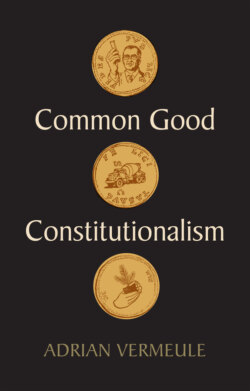Читать книгу Common Good Constitutionalism - Adrian Vermeule - Страница 15
Courts and the Common Good
ОглавлениеThroughout the book, I emphasize that courts need not be the institutions charged with directly identifying or specifying the common good. A division of institutional roles can, under particular circumstances, itself conduce to the common good. It is not written in the nature of law that courts must decide all legal or constitutional questions. The precise allocation of law-interpreting power between courts and other public bodies is itself a question for determination at the constitutional level.
In America, the classical tradition held that so long as determinations are made within the jurisdictional competence of public bodies, for legitimate ends, and on rational grounds, they are a matter for the public authority, not the courts. A strong legal principle of deference by courts to the determinations of legislatures was part and parcel of our law from the beginning. One of my particular claims is that our small-c constitutional order developed over time to extend this principle to the institutional presidency and administrative tribunals. Today our constitution supports the legitimacy of broad delegations to the executive,24 shaped and constrained by principles of legality that ensure that the executive acts rationally in ways ordered to the common good.25 Determination is plausibly the remote ancestor of deference in all sorts of forms that are familiar in the administrative state, such as Chevron deference26 to administrative agencies.
A corollary of the nature of determination is that the public authority – including the executive exercising delegated authority – may, without transgressing its boundaries, engage in what I have called “rationally arbitrary decisions.”27 Because determination involves specification within a range in which reason need not yield a unique answer, some element of irreducible judgment will be required. Should the statute of limitations for a given offense be ten years or fifteen? Or perhaps twelve? The law is not so sophomoric as to demand a first-order reason for the choice of one particular number over another, for it is impossible to give any such reason, at least within a reasonable range of choices. In this sense, reason itself allows a certain degree of arbitrary specification, which will thus not be coded as “arbitrary” in the legal sense for purposes of the common good framework.
